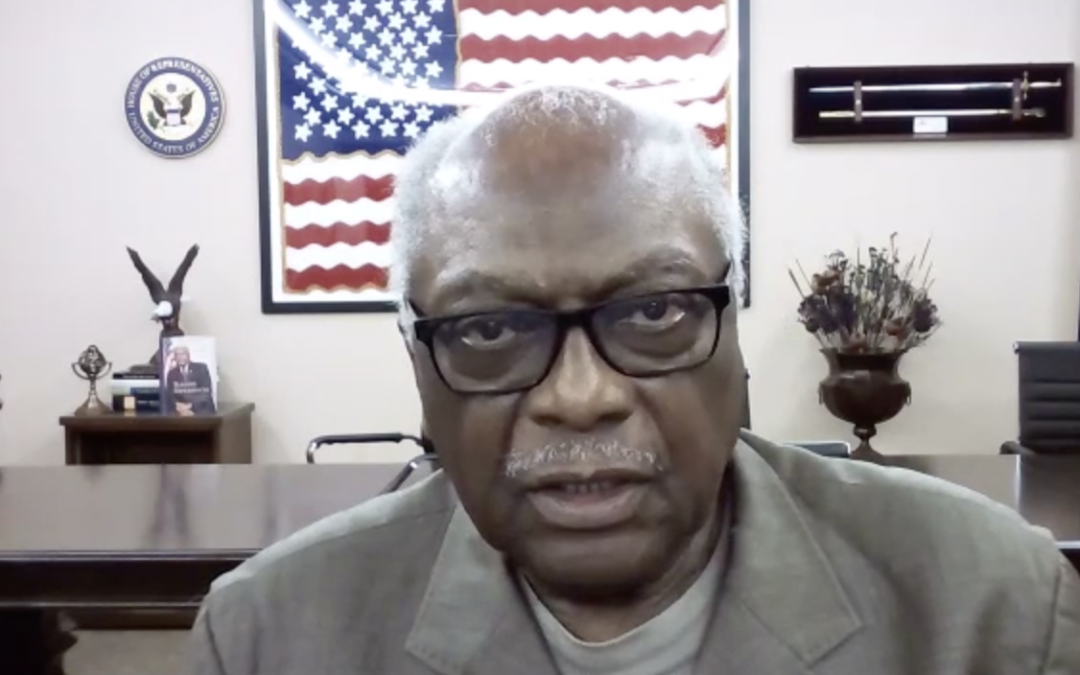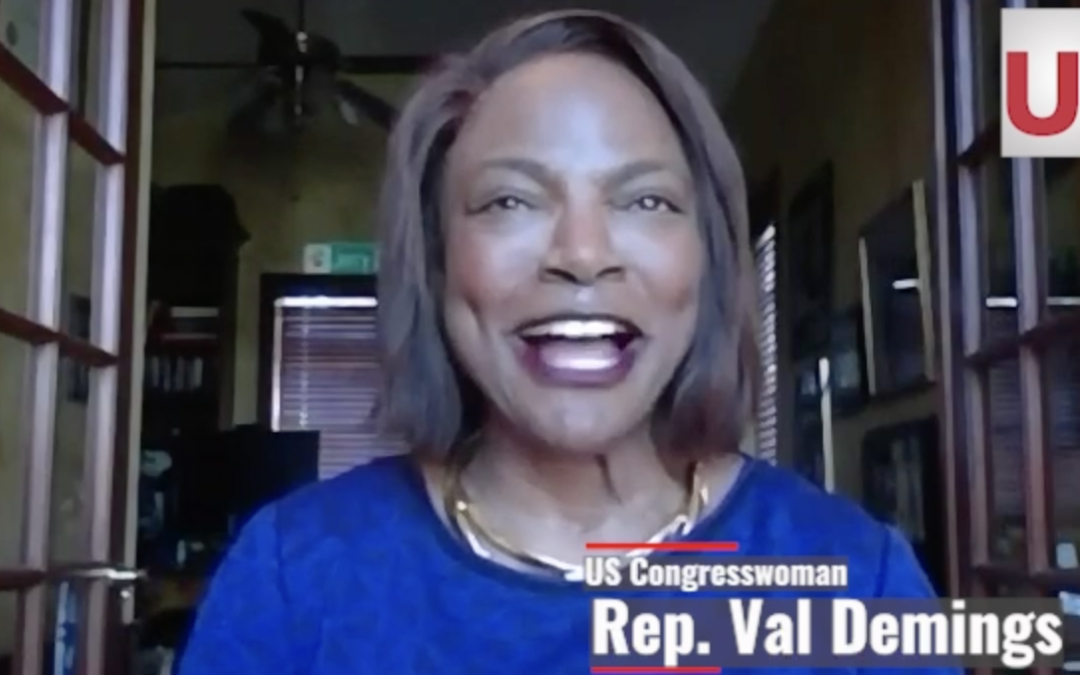
by Allen Reynolds, UrbanFaith Editor | Nov 6, 2022 | Commentary, Headline News, Social Justice |

Every two years in the United States of America we have federal, state, and local midterm elections. And every year we hear from politicians or administrative officials about why we should vote for them (or not vote for their opponent). The people elected during midterms become the leaders who manage our communities’ money, advocate for our well being, determine how our justice system works, shape our education systems, provide for our safety, dispose of our waste, maintain our environment, and more. Local and state elections are the most impactful on our day to day lives and yet few of us even know who our representatives, administrators, or public officials are.
Our democracy is at stake. Politicians, media outlets, public figures, scholars, researchers, activists, and others have all sounded the alarm. There are thousands of people across the country working in coordinated ways to undermine our system of elections, take control of our local governments, and advocate for political violence. Many of those who are part of this movement claim to be Christians. There are politicians running and influencers on social media who have convinced millions of Americans to place greater faith in lies and liars than in Christ Himself. They devote their energy toward upholding election lies and won’t trust anyone that doesn’t agree with them. They are unmoved by evidence, only valuing the echoes of affirmation in their social circles.They have created a religion of suspicion and their faith is distrust. Believers must stand in contrast with the false followers of Jesus who are really white Christian nationalists and make sure to vote for leaders who represent justice, equality, value, and care for all people regardless of their background. We cannot support or endorse hate, fear, and violence in the name of our Lord and call it faithfulness. We have learned we cannot be slaves to single issues at the federal level and neglect policies and positions at the local and state levels. We have to vote in midterm elections like this one, or our votes may become truly meaningless in the future. It is only pride that keeps us from seeing that if fascist governments can rise in other other countries that it can happen here if we do not participate.
As a voters we fall easily and deeply into tribalism, the identification and support of leaders we feel like are part of “our group.” Unfortunately when we do not have a president to vote for, most of us don’t vote at all. According to Pew Research Center 62% of people of voting age turned out in the 2020 elections, which was a record breaking number, mostly fueled by the bitter cultural wars in the Presidential race. But consider that means that 38% of people who could vote, did not. In midterm elections the numbers are usually under 50%. Literally the minority of people elect leaders who impact all of our lives. And yet when we don’t vote or care about who to vote fore beyond the top officials, we miss out on a critical piece of our democracy.
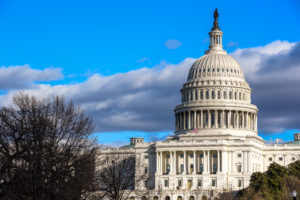
West side of the Capitol Building at Capitol Hill in Washington DC. Daily photos in the afternoon, good for late autumn, winter and early spring illustration
We are engaged and fervent whenever we elect the president, even though most of us will never meet them and rarely understand their impact on our day to day lives. A president is a symbolic leader for many of us, representing our collective hopes, aspirations, and ultimate accountability. But a president can make none of the changes we imagine for ourselves and our communities without the cooperation and support of the legislature. The laws passed by legislative bodies are ineffective when the courts don’t enforce them. Our entire government is built on cooperation between branches and accountability through voting, both of which are under greater threat than many of us could imagine. We must vote in midterm elections, otherwise our desires to see flourishing in our communities will remain only dreams. We need to know who our tax assessor is, our city council members, our sheriffs, our judges, our attorney generals, our state representatives, our county officials, our congresspeople, and our governors.
As people of faith we have an even greater responsibility to be informed voters and to vote. The United States of America is not the Kingdom of God. Jesus is the eternal King of the Kingdom and He is not up for election. No leader can serve as proxy for Jesus over our lives or our nation. We are not voting to put Jesus Christ in office. He is already reigning over everything by His own power. But we can absolutely elect leaders who agree with our Christian principles of justice, help for the poor, safety for children, value for all lives, and care for the environment. We must look to our faith to inform what matters in our personal politics, and value other people’s faith or lack of faith enough to care for them too. Jesus taught us to seek justice for those who are different from us. Jesus taught us to hold leaders accountable. Jesus taught us to pay special attention poor people, homeless people, those from different countries, those with disabilities, those with food insecurity, and young people. Jesus taught us to love our neighbors as we love ourselves. Which means we have to vote for leaders and policies that will positively impact not just us, but members of our community.
We should vote because we need more good in our government. And we should know our leaders from city hall to capitol hill because their decisions impact us at home, work, school, church, in the park, in the street, in the store, and everywhere else in this country.
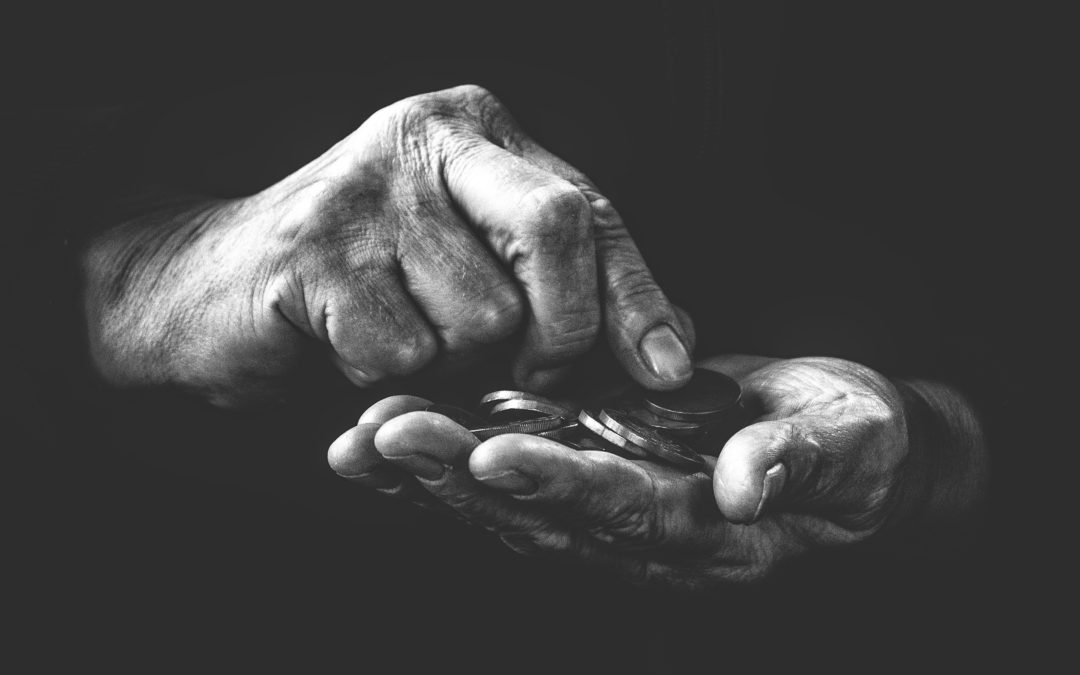
by Diane Randall, RNS | Sep 30, 2021 | Headline News |
(RNS) — The devastating COVID-19 health crisis has become an economic crisis for millions of people — but not for everyone. Last year, families across the United States struggled to put food on the table and balance the responsibilities of childcare and work (assuming they still had a job), but the wealthiest people in our country only got wealthier.
That wealth has not trickled down to families who are struggling to pay their rent, feed their children and create an economically secure quality of life.
The American Rescue Plan — the COVID-19 relief bill passed in March — expanded eligibility for two of the most vital anti-poverty programs we have. It made the Child Tax Credit fully refundable, fixing the gap that excluded families in poverty from receiving the same benefits as their higher-earning counterparts.
It also expanded the Earned Income Tax Credit for workers without children, young workers ages 19-24 and older workers over age 65.
Both adjustments put more money into the pockets of low-income people who were previously ineligible — many of them frontline workers in the pandemic. But these payments will expire on Dec. 31 if Congress does not extend them.
These tax credits work, and, not surprisingly, they are wildly popular. The Child Tax Credit provides a lifeline of economic support to families nationwide who need money to pay for daycare, groceries, utilities, rent, and health care bills that pile up nonstop. This is money being pumped back into local economies coast to coast right now, creating a virtuous economic cycle of helping people in need and local business.
Recently, I spoke with Barbie Izquierdo on the value of programs like these. An advocate and consultant who eloquently gives voice for food justice based on her personal experience, Barbie told me that despite all her work — sometimes full time, sometimes part time, often working more than one job — she “would still come home to an empty fridge.” Her story is shared by hundreds of thousands of families across our country.
To this day, the tax credits are one of the primary barriers keeping Barbie from falling back into poverty as she raises her 14- and 16-year-old children as a single mother. “(They) help you catch up and it alleviates some of the burden of being reminded that you’re poor. They’ve definitely helped me on many occasions,” she explained. “Who knows if I would be here today if I didn’t have that help?”
Since July, millions of families have been receiving Child Tax Credit checks each month. The latest government data indicates that these robust federal programs have put a dent in poverty, which has cascading benefits for children now and in their future — if we can keep these programs in place past the end of the year.
As Congress continues to negotiate additional recovery legislation, we have a historic opportunity to permanently invest in the future of our children. Congress should seize this moment to not only give immediate help to tens of thousands of their constituents but also to strengthen our country’s future.
Specifically, we must adjust the tax code that bends over backward for the extremely wealthy while treating those who struggle every day to afford food and housing as a burden. The more Congress can raise in revenue, the bigger the opportunity we have to address poverty and hunger while investing in our children. It takes real political will to require corporations and the wealthiest among us to pay their fair share. But we expect nothing less.
As a Quaker, my faith and practice encourage me to treat every person as a beloved child of God, which means I am called to do all I can to foster a more equitable, ethical world in which every person can flourish.
I believe Congress wants to help families in need, to ensure a better world for all. This is their opportunity to support the full refundability of the Child Tax Credit. This is the political moment when we can make transformational change in our country.
( Diane Randallis the general secretary of the Friends Committee on National Legislation, a national, nonpartisan Quaker lobby for peace, justice, and the environment. The views expressed in this commentary do not necessarily reflect those of Religion News Service.)
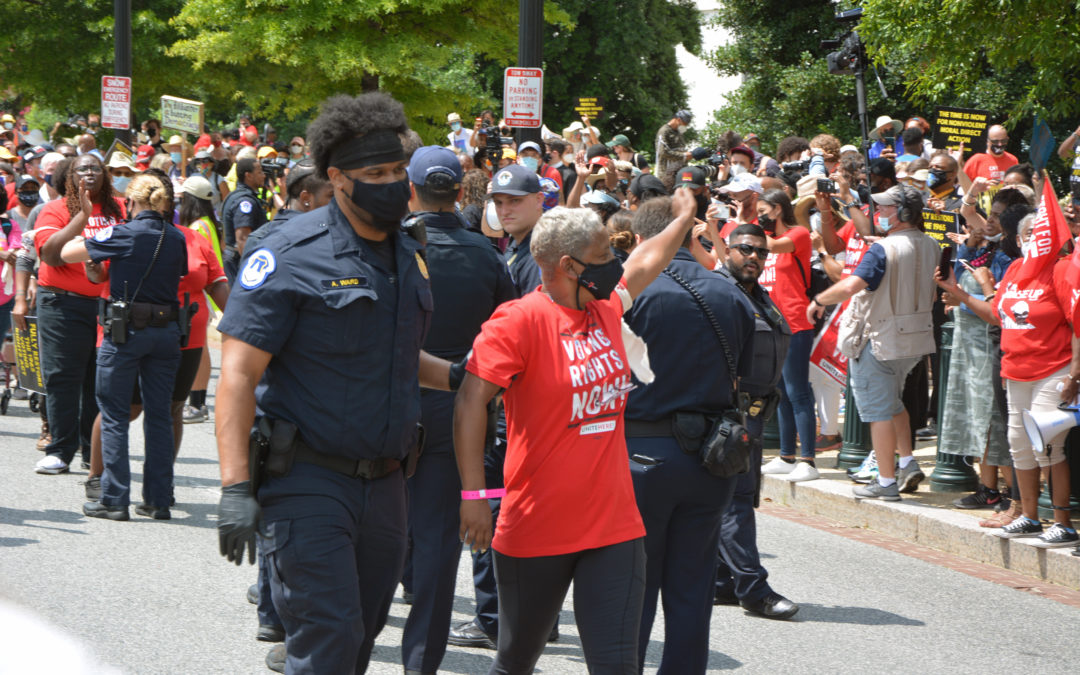
by Jack Jenkins, RNS | Aug 3, 2021 | Headline News, Social Justice |
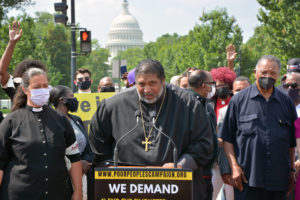
The Rev. William Barber, center, flanked by the Rev. Liz Theoharis, left, and the Rev. Jesse Jackson, right, speaks during a Poor People’s Campaign demonstration in Washington, Monday, Aug. 2, 2021. RNS photo by Jack Jenkins
WASHINGTON (RNS) — As police escorted a demonstrator in a wheelchair away from the chanting throng descending on the Capitol Monday (Aug. 2), fellow protesters turned to watch the person go. The group paused for a moment, then altered their call.
They screamed in unison: “Thank you! We love you!”
The lone protester nodded, fist raised. The crowd erupted in applause.
It was a moment that played out again and again over the course of the afternoon. According to Capitol police, more than 200 faith-led demonstrators were arrested while praying, singing and protesting in the street, hoping to draw attention to voting rights and a slate of other issues participants argued impact the poor and low-wage workers.
The sprawling demonstration was organized by the Poor People’s Campaign, an advocacy group led by the Rev. William Barber II and the Rev. Liz Theoharis that tends to support left-leaning policies. Monday’s action on the Hill constituted one of the largest mass-arrest nonviolent protests at the Capitol in recent memory and attracted an array of prominent voices, including civil rights icon the Rev. Jesse Jackson and Luci Baines Johnson, the daughter of late President Lyndon B. Johnson.
At a rally near the Capitol immediately before the march, leaders laid out what they insisted were interconnected issues driving their protest, which centered on voting rights, immigration reform, a $15 an hour federal minimum wage and eliminating the Senate filibuster that has stymied passage of related federal legislation.
“Filibuster is a sin!” Barber declared. “Making essential workers work during a pandemic — and risk their lives to save this country — and then not give them a living wage is sin.”
The event also featured music. Singers led the crowd in belting: “Somebody’s hurting my brother, and it’s gone on far too long. And we won’t be silent anymore!” The singers changed the lyrics as the song progressed, inserting lines such as “Somebody’s stealing our wages!” and “Somebody’s blocking our voting rights!”
The song echoes the sweeping, evolving agenda articulated by a variety of faith leaders across the country in recent months, particularly those who operate within religious communities of color.
The Poor People’s Campaign took a leading role in propelling that agenda this summer in the wake of Republican-led efforts to pass state-level elections bills many activists decry as restrictive. Indeed, Monday’s march follows what organizers called a “season” of similar demonstrations organized by the PPC over the past two months in Washington, Arizona and most recently Texas, where activists mimicked the 1965 civil rights march from Selma to Montgomery, Alabama. The group walked 27 miles from Georgetown to Austin, Texas, in late July to oppose voting restrictions.
Texas pastor the Rev. Frederick Haynes III, who joined the Texas march and has vigorously opposed state elections bills, was among the speakers at the Washington rally.
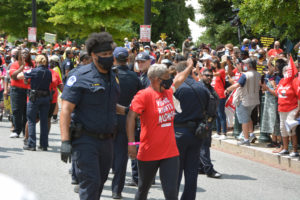
Activists are arrested during a Poor People’s Campaign demonstration in Washington, Monday, Aug. 2, 2021. RNS photo by Jack Jenkins
“President Biden, Democrats and Republicans, the culture will put it like this: If you come for us and we didn’t send for you, you don’t want this smoke,” said the Progressive National Baptist, whose denominational convention is happening this week. “You don’t want this smoke because we are fighting for the soul of this nation.”
The activists’ efforts have hit roadblocks with some Democrats at the national level, particularly Sen. Joe Manchin of West Virginia and Krysten Sinema of Arizona. Both opposed efforts to pass minimum wage increases and eliminate the filibuster this year — in Manchin’s case, despite a meeting with Barber and low-wage workers. The Poor People’s Campaign has since targeted bothlawmakers with protests.
Barber was quick to harangue members of both parties during the rally, accusing some Democrats of heaping praise on late civil rights icon Rep. John Lewis but failing to support his vision for voting rights.
“Some Democrats told us: ‘If y’all organize, don’t connect wages to voting rights,'” Barber said. “I’m too old to play that.”
He added: “The same people suppressing the votes suppress your wages, won’t fix your utility grids, suppress your health care, cut public education, block living wages — you’ve got to make the connection.”
Barber also offered his own adaptation of the Scripture passage from Isaiah 10:1-3:
“Woe unto you hypocrites who pay attention to all of Robert’s Rules (of order), all the made up rules of the Senate and the House, but you filibuster justice. And filibuster mercy. And you filibuster faithfully.”
Barber was briefly joined at the rally by Sen. Raphael Warnock, himself a prominent Georgia pastor. However, Barber explained Warnock would not speak because the campaign generally does not let politicians address their protests. Warnock is a champion of the For the People Act, a federal voting rights legislation Barber and others praised but Manchin opposed.
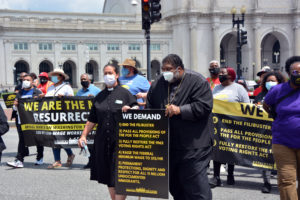
The Rev. Rev. Liz Theoharis, center left, and the Rev. William Barber lead a Poor People’s Campaign demonstration march in Washington, Monday, Aug. 2, 2021. RNS photo by Jack Jenkins
Among the clergy milling about the crowd — which also included many red-shirted members of the labor union Unite Here! — were the Rev. Patrick Messer, a United Church of Christ pastor who just left a church in Nebraska, and the Rev. Deana Oliva, a Unitarian Universalist minister from Kentucky.
Asked what spurred them to be part of the protest, Oliva was aghast at the thought of not participating — “Where else would we be?” — and Messer pointed to Jesus.
“I’m here because in Jesus’ first sermon he said the spirit is upon me to bring good news to the poor, and to bring deliverance to the captive,” Messer said. “We’re here to bring a $15 minimum wage to all workers, restore the Voting Rights Act of 1965 and pass all the provisions of the For the People Act and end the filibuster.”
The daughter of President Lyndon B. Johnson — who signed the Voting Rights Act into law — also addressed the crowd at the event. Luci Baines Johnson noted she could not speak for her father, but insisted he would have wanted her to be with activists “in the fight for social justice and voting rights.” After voicing support for the For the People Act and the John Lewis Act, another voting rights bill, she invoked Scripture while calling for bipartisanship.
“In the 1960s, Democrats and Republicans stood up together for social justice,” she said. “It was the right thing then, and it’s the right thing now. Now more than ever before, we need to — in the words of Isaiah — come and reason together to get a more just America for everybody.”
The Rev. Jesse Jackson also addressed the crowd, bemoaning what he called a nation “in crisis” and voicing a willingness to go to jail for the cause.
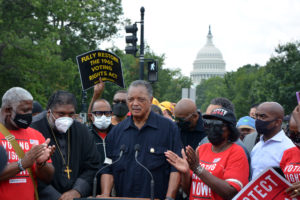
The Rev. Jesse Jackson, center, speaks during a Poor People’s Campaign demonstration in Washington, Monday, Aug. 2, 2021. RNS photo by Jack Jenkins
He led the group in a call-and-response chant: “I am! Somebody! I may be poor! But I am! Somebody! I may be unemployed! But I am! Somebody! I may not have health care! But I am! Somebody! Respect me! Protect me! Elect me! I am! God’s child!”
Others who delivered either speeches or prayers at the event included prominent Muslim American activist Linda Sarsour, National Council of Churches President Jim Winkler, Simple Way founder Shane Claiborne, activist and former chairman of the San Carlos Apache Tribe Wendsler Nosie and several low-wage workers or people impacted by poverty.
After the speeches, the activists massed into a column and marched toward the Capitol, with clergy walking alongside low-wage workers and those impacted by poverty. Tensions briefly flared with police when they insisted demonstrators stay on the sidewalk for one stretch of their march. Protesters initially refused, walking past police before a wave of new officers arrived and corralled the group off the street.
Demonstrators took to the street a short time later after processing past the Supreme Court toward the Hart Senate building. One column of protesters stayed on the sidewalk, but a separate group — including Barber, Theoharis, Jackson and what appeared to be Messer and Oliva — positioned themselves in the middle of the road, refusing to move. Some briefly requested entry to the Hart building at Barber’s urging, but police rebuffed them, and they returned to the street.
As demonstrators sang and chanted (“What do we want? Voting rights! When do we want them? Now!”), officers began arresting those in the road one by one, carefully leading them away. Cheers rose up as Theoharis, Barber and Jackson were arrested, and they were followed by hundreds more: clergy of multiple faiths, low-wage workers, young activists and elderly people in walkers or wheelchairs were all among those arrested.
When each one arrived at the area where other arrestees were waiting to be processed, shouts and applause rang out.
It remains to be seen how lawmakers will react to the growing protest movement. Sen. Sherrod Brown of Ohio was spotted walking quickly past the protest. When demonstrators shouted for the end of the filibuster, he quickly replied, “I agree with you,” a reference to his public willingness to end the filibuster if Republicans continue to use it to block liberal legislation.
The mixture of religious and labor demonstrators appeared to be clear in their cause on Monday and dedicated to convincing Congress to support it. They sang many songs, but one favorite seemed to be aimed directly at lawmakers: It simply asked, over and over, “Which side are you on?”




